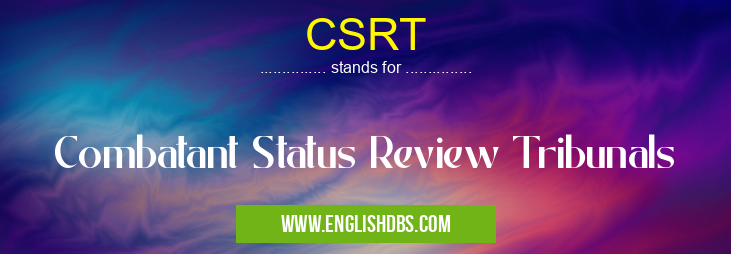What does CSRT mean in UNCLASSIFIED
The acronym CSRT stands for Combatant Status Review Tribunals. Following the events of 9/11, the United States government initiated a series of tribunals to review the status of combatants held in Guantanamo Bay Detention Camp (also known as GTMO or Gitmo) who were suspected of being linked to terrorism activities and organizations. The goal of the CSRT process was to determine whether these individuals should be designated as unlawful enemy combatants, which would allow them to be detained indefinitely by the United States without charge indefinitely. The CSRT is one element of the War on Terror that has been heavily criticized by human rights activists, who argue that it strips detainees of their right to due process and legal representation.

CSRT meaning in Unclassified in Miscellaneous
CSRT mostly used in an acronym Unclassified in Category Miscellaneous that means Combatant Status Review Tribunals
Shorthand: CSRT,
Full Form: Combatant Status Review Tribunals
For more information of "Combatant Status Review Tribunals", see the section below.
Definition
A Combatant Status Review Tribunal (CSRT) is a tribunal convened by the US government during its War on Terror in response to 9/11 in order to determine whether detainees held in Guantanamo Bay should be designated as “unlawful enemy combatants” or released. The CSRTs are made up of three military personnel, usually officers from different branches of service. During the tribunal process, detainees must answer questions about their alleged involvement with terrorist groups or activities; they do not have access to lawyers or other legal representatives. The decisions made at these tribunals can have far-reaching implications for those involved, including indefinite detention without charge or trial.
Essential Questions and Answers on Combatant Status Review Tribunals in "MISCELLANEOUS»UNFILED"
What is CSRT?
Combatant Status Review Tribunals (CSRT) are a United States process that involves review of the status of captives held by the United States in its War on Terror. The CSRT determines whether captives are, or are not, “enemy combatants” and may also determine their continued detention.
Who has jurisdiction over CSRTs?
The Department of Defense has exclusive jurisdiction over all CSRT proceedings.
Are CSRT proceedings open to the public?
No, CSRT proceedings are closed to the public and confidential.
How often does a CSRT take place?
A CSRT is conducted upon the initial capture of a detainee for detention in U.S. custody, and then held at least annually thereafter until the detainee is released or transferred out of DoD custody.
What takes place during a CSRT?
During a CSRT proceeding, both the detainee and military representatives present evidence pertinent to determining whether there is reasonable cause to believe that the detainee meets the criteria to be an enemy combatant subject to detention under applicable law and policy.
Does a detainee have access to legal counsel during a CSRT?
Detainees do not have access to legal counsel during their CSCT proceedings; however, they may consult with US-appointed Personal Representatives who provide assistance throughout it as well as help explain any available options before the tribunal when appropriate.
Who reviews a detainee's case after a CSRT hearing?
After each hearing, an Administrative Review Board (ARB) reviews all relevant information related to each detainee’s case and makes recommendations on disposition options such as transfer or release from U.S. custody for consideration by higher authorities.
Does every detainee receive an ARB review after going through a CSRT hearing?
Yes, all detainees who remain in U.S. custody after being assessed by a Tribunal at least once receive an ARB review every 6 months thereafter unless otherwise ordered.
Final Words:
The implementation and use of Combatant Status Review Tribunals has been controversial since it was first introduced following the events of 9/11. Critics have argued that it violates basic human rights by denying detainees access to legal representation and due process and allowing them to be indefinitely detained without charge or trial if they are determined to be 'unlawful enemy combatants'. Despite this criticism, CSRTs remain an integral part of the US government's War on Terror strategy; however, there have been calls for reform in order to ensure that all detainees are treated with fairness and respect within its framework.
CSRT also stands for: |
|
| All stands for CSRT |
